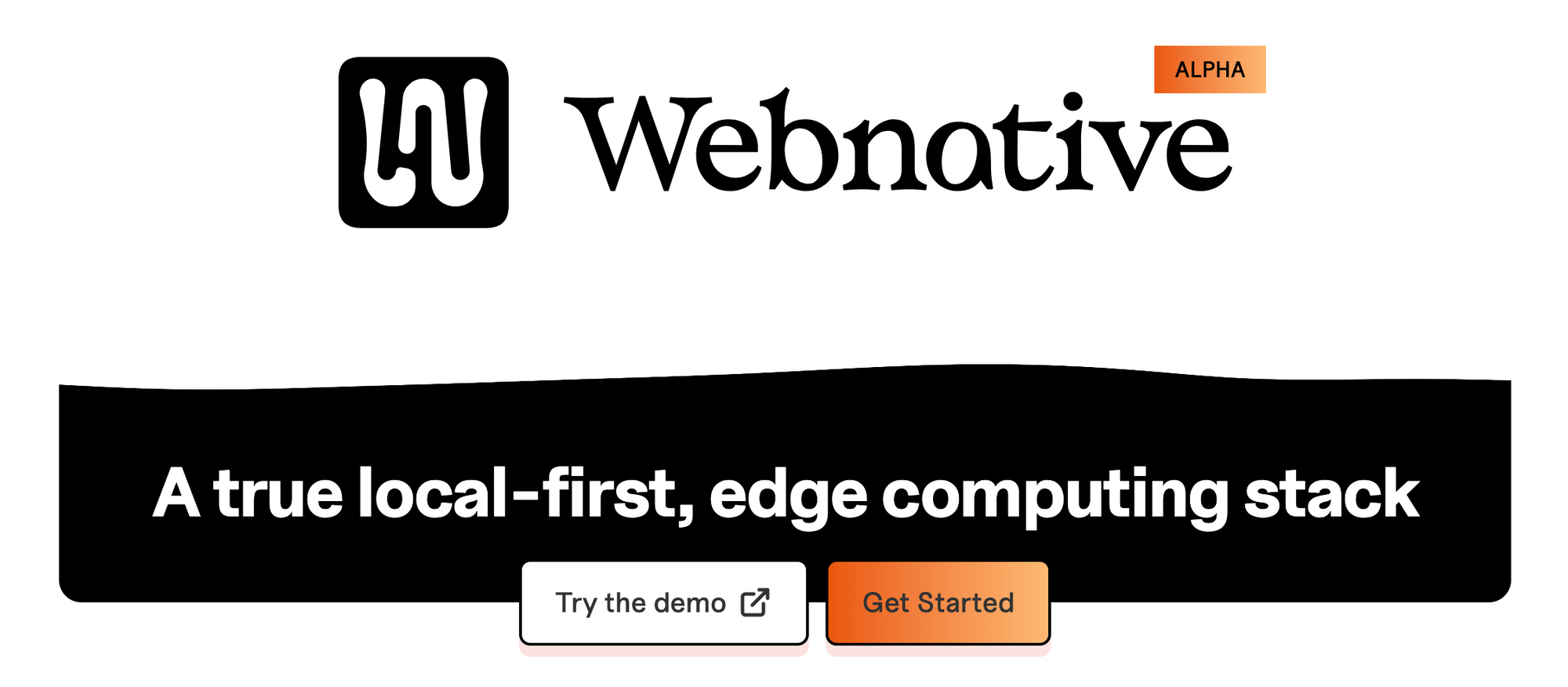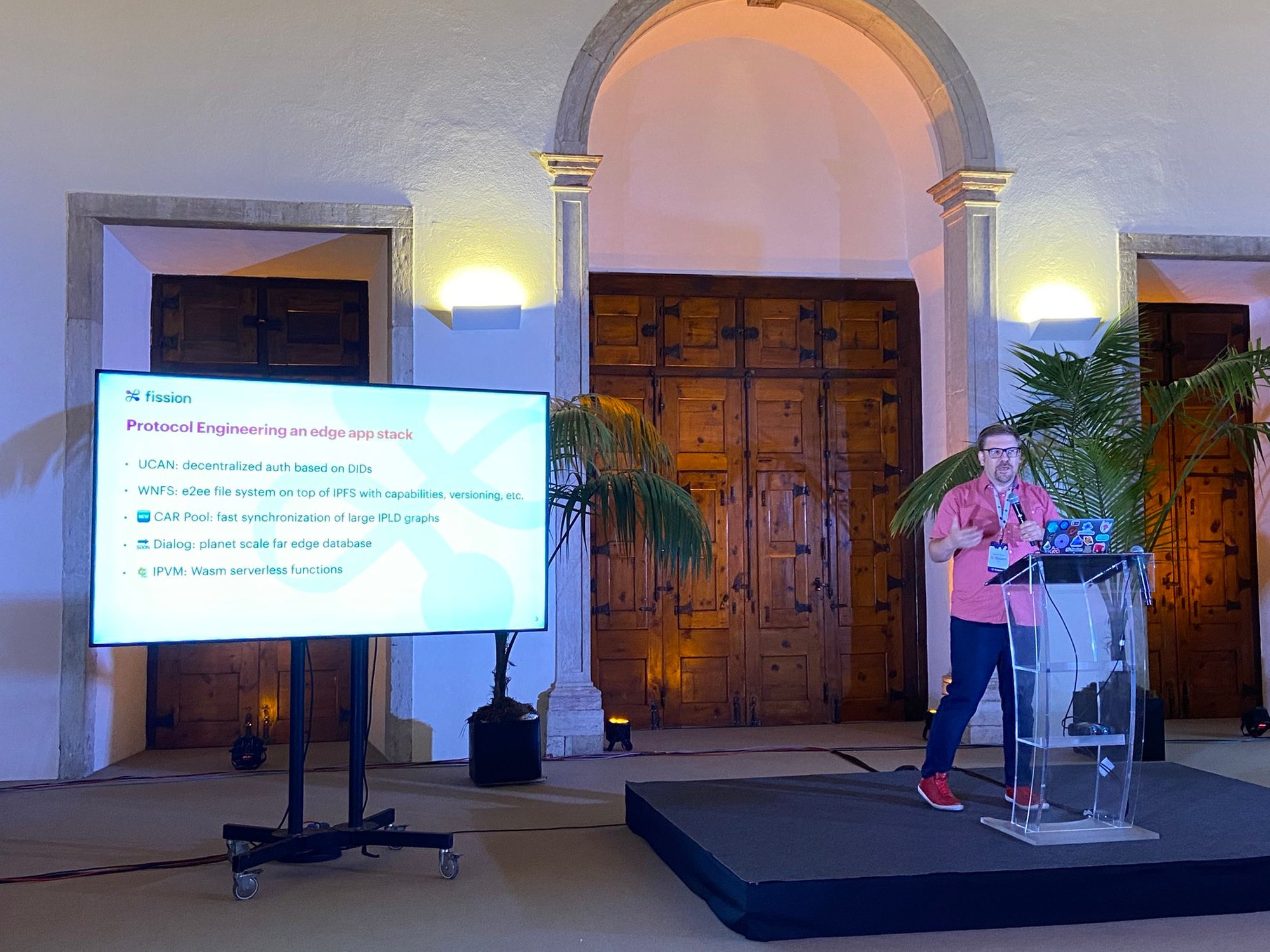2022 has been an amazing year of growth, with many of our initiatives gaining momentum. Let's review what we accomplished this year and then take a look at what we have planned for 2023.
2022: A Year in Review
2022 was an exciting year at Fission. We continued to build out our signature edge app developer toolkit, Webnative SDK, and laid the foundation for our database and virtual machine. We celebrated several research breakthroughs and grew our company's presence and team.
Templates Added to Webnative SDK
Webnative SDK is Fission's core product suite for edge app developers. It is a true local-first edge computing stack, enabling passwordless accounts and secure, user-owned public and private data.
This year Fission introduced a few templates to the SDK. The first was WalletAuth, which lets users sign into webnative apps using their Ethereum blockchain address. There are two versions of the WalletAuth template - Svelte + TypeScript and React + TypeScript.
The second is Webnative App Template, which empowers developers to build edge apps in the browser without building all of the infrastructure from scratch. We launched WAT with built-in passwordless login and device-linking (which uses UCANs for authentication), powered by the Web Crypto API. We also included encrypted IPFS storage (by integrating WNFS). There are two versions of the Webnative App Template - Svelte + TypeScript and React + TypeScript.
Third, we created a CLI-generator for both WalletAuth and WAT.
Finally, we launched a new website for Webnative SDK, packed with resources including these game-changing templates, demos, and developer documentation.

Research Accomplishments
We were able to make an exciting contribution to distributed systems data management by inventing the Skip Ratchet. The skip ratchet enables developers to move more efficiently across data in a hash chain. It builds on the idea of deterministic skip lists and has built-in security enhancing features, like the ability to limit read access.
We also submitted the first IPIP for IPFS that helps improve the protocol itself. Redirect Support for IPFS makes it easier to host web applications by telling the Gateway to intercept missing paths and treat them as rewrite rules, letting the single HTML file and the JavaScript it loads handle all of the routing. In other words, no more ugly error messages. Hello, redirected pages!
Conferences We Attended
2022 was the year of the conference! Now that the worst of the COVID-19 pandemic has mercifully subsided, we've been able to travel and present in person at conferences again! This year we went to Portugal, Germany, The United States, Iceland, and France to give talks on our work building Webnative SDK.
Here is a list of the conferences and their corresponding blog post recaps:
CoD Summit
LabWeek22 + FIL Lisbon

Strange Loop
HPTS
Dappcon 2022
CascadiaJS
IPFS Thing
BlueYard's On | Off Chain side event at ETHCC in Paris
Plans for 2023
Now that we've reviewed 2022, let's look ahead at our plans for 2023. As a leader and contributing member in a robust community, we have many initiatives in the works! Here are a few we're excited about:
Webnative SDK Additions
IPVM, our VM that brings content addressed computation to IPFS, is coming along nicely! Our CTO Brooklyn Zelenka is working on the spec now. If you'd like to learn more about IPVM, check out this breakdown from Brooklyn's presentation at IPFS Thing earlier this year.
Dialog, our far edge database for local-first applications and autonomous computing agents, is now RhizomeDB! We are focusing on Rust, however others will certainly be able to create implementations in other languages. The repo will be private initially, but we'll be sure to keep you updated as we hit significant milestones! In the meantime, do check out these posts that provide a first look and explain our approach in more detail.
Ecosystem Projects
Commons Funding: Fission is a fiscal host and contributor on Open Collective and is currently spearheading several fundraising initiatives, including one to bring IPFS support to Mastodon.
CASA: Fission is a member of the Chain Agnostic Standards Alliance, working to make blockchains interoperable. We initiated CAIP-25 RPC Methods in response to MetaMask deprecating ETH encrypt/decrypt, and we are working with others in CASA to document a secure way for blockchain key material to be used for encryption and decryption.
Permissioned Data Working Group: This is a new working group focused on enabling permissioned and private data on Filecoin.
FIL Accounts Working Group: We will continue our work to integrate UCAN and WalletAuth into FIL Accounts in 2023.
WhoCAN / NNS: WhoCAN and the Name Name Service introduce a new way to share UCAN permissions with keys without knowing what those keys are. Want to learn more? Be sure to join the monthly UCAN community calls!
Events
We will return to IPFS Thing in 2023 with several new presentations, undoubtedly with updates on IPVM and RhizomeDB. We will also be presenting at various other conferences throughout the year.
Private Set is a new Fission-hosted series of events at the intersection of Web3 identity, privacy, data, and encryption. It will exist as a side event at various conferences. More details on our first Private Set event to come!
Causal Islands is Fission's inaugural Future of Computing conference. We are thrilled to bring you presentations on programming languages, distributed systems, ML, AI, and other emerging tech.
The event will take place in Toronto, Canada, April 25-27 at the Paradise Theatre. Early bird tickets are on sale now! There is also a virtual option for those who cannot make it to Toronto. Be sure to follow us on Twitter at @causalislands for speaker and programming announcements.

As you can see, we have many exciting plans for 2023. We hope to see you at one of our events or on an upcoming community call. Thank you for joining us on this journey!
